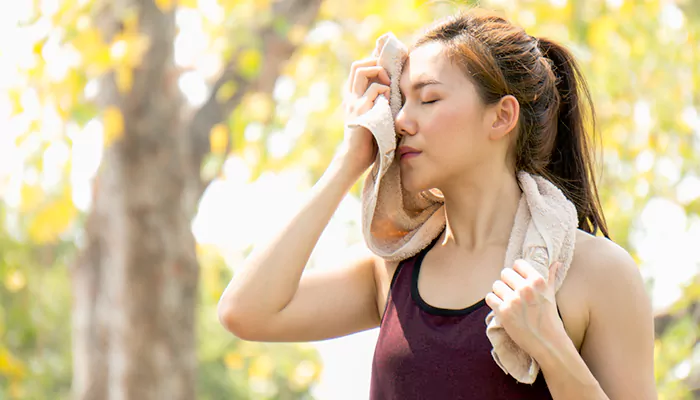Understanding Post-Shower Sweating and How to Manage It
There are many reasons why you sweat after a shower. First, your body temperature rises swiftly after a hot shower or bath. Second, some people experience increased humidity in their airways after taking a shower due to the moisture from the steam and water droplets. This can lead to increased sweating.
- Shreya Ghai
- 10 August, 2024
- 2 mins ago

Understanding Post-Shower Sweating and How to Manage It
There are many reasons why you sweat after a shower. First, your body temperature rises swiftly after a hot shower or bath. Second, some people experience increased humidity in their airways after taking a shower due to the moisture from the steam and water droplets. This can lead to increased sweating.
Why Do I Sweat Immediately After Taking a Shower?
So, when you take a hot shower, the steam from the water increases the temperature and humidity in your bathroom. This causes your body temperature to rise and cause you to sweat.
The hot water left on your skin and hair after a shower further warms your body. As the steam from the hot water and the temperature in the bathroom increase, the humidity and temperature in the bathroom will increase, which will increase your body temperature and cause you to sweat. If your sweating gets worse when it starts to dry out, the problem may simply be due to dry skin. Rubbing the skin with a towel creates friction and heat. Warm clothes and towels after a shower warm your body quickly and cause you to sweat.
How To Stop Sweating After a Shower?
It Is Better to Cool Down Before Taking a Shower
After exercising, wait half hour to cool down before taking a shower. This will lower your body temperature and help you cool down after a shower. Sweating will be reduced.

Lower The Heat in The Shower
After you take a shower, try lowering the temperature of the water slowly before getting out. Gradually reduce the amount of hot water in your shower to cool your body. Try to rinse your hair with cold water. This way, there will be no hot water left on your scalp or hair to warm your head.
Check Bathroom Ventilation
Good ventilation in the bathroom also helps control room temperature. Good ventilation can also reduce moisture in your bathroom. Keep windows open as long as possible after showering to remove steam and condensation from the shower.
Leave the humid environment
In addition to lowering the water temperature to avoid sweating after a shower, it also helps to ventilate the bathroom as much as possible. Regardless of whether there are vents or windows for adequate ventilation, leave the humid environment as soon as possible after showering, and if you must remain in the bathroom, soak a washcloth in cold water and wipe your face and scalp skin.
Do Not Be Harsh with Your Skin
Vigorous rubbing with a towel when drying creates friction that increases body temperature, which not only worsens sweating but can also cause excessive dryness and skin irritation. Pat your skin dry with a light towel or wear a commercially available terry bathrobe to avoid chafing.
Get Dressed in Your Room Instead Of In The Shower
Even if you get dressed in a stuffy, humid shower room, your body will sweat even more. Wearing clothes outside the shower allows your body to cool down to room temperature and prevents sweating.










